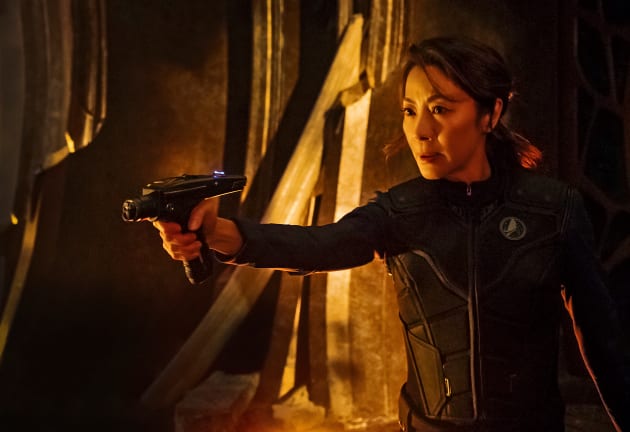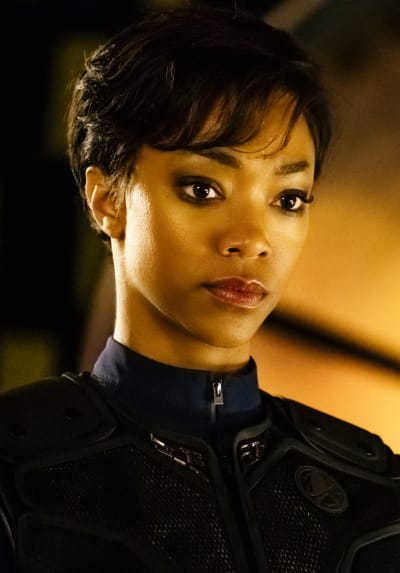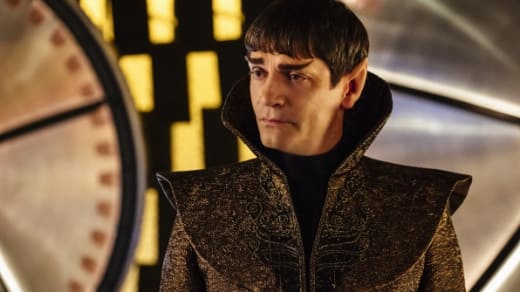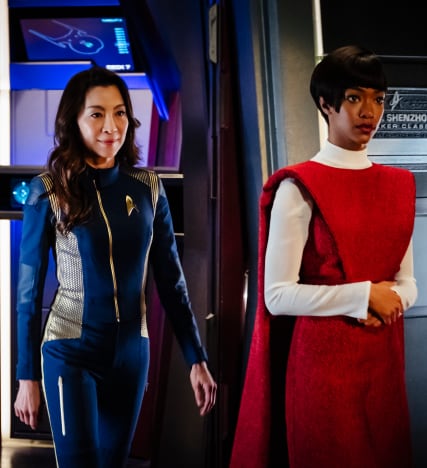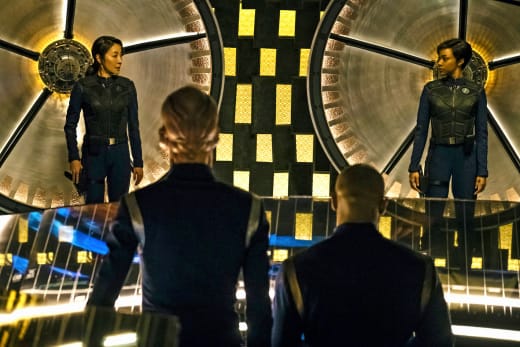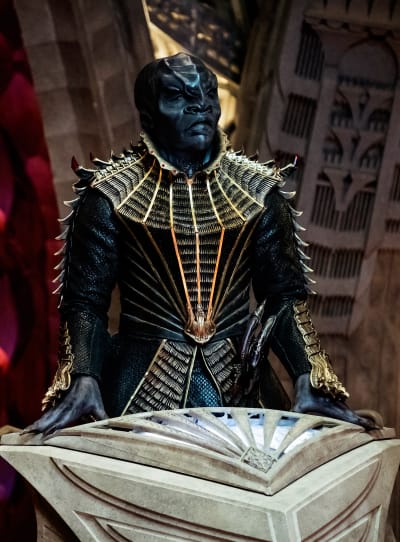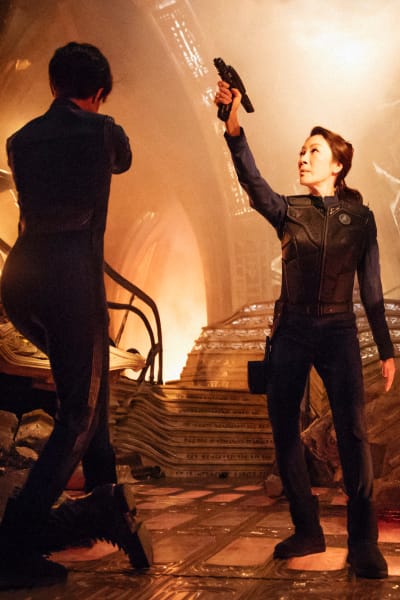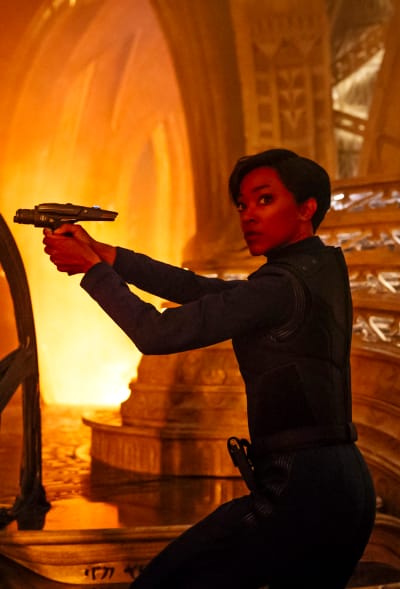Where the premiere oriented the audience (somewhat) in the here and now of Burnham and the Shenzhou’s crew, Star Trek: Discovery Season 1 Episode 2 is more concerned with where they came from.
It also spends a great deal of effort to further build credibility for this series in the Trek ‘verse.
With the conflict ramping up dramatically, we get glimpses of various Klingon and Starfleet vessels and their respective crews.
The cinematic glory is pretty impressive.
And it’s not just the tech and the politics that make us feel at home. Before there was Picard, before there was Kirk, before there was STAR FLEET, there was Sarek.
What a brilliant move to tie ST: Discovery into the ‘verse with someone we’ve actually met before. Repeatedly.
After all, this isn’t Star Wars where they can just throw in an early version of R2 or C-3PO to give us the twinges of nostalgia. They tapped into it here with Spock’s freakin’ DAD. If Sarek is in the house, this is proper Trek.
Sarek: So many years and you still allow emotional considerations to impede your logic.
Burnham: They INFORM my logic.
I found it weird to watch James Frain NOT being a villain but once I got past it, I appreciated his faithfulness to the canon and his respect for the character.
Ambassador Sarek has always connected with humans. That he mind melds with Michael Burnham to save her life as a child and then raises her on Vulcan is not a stretch of the imagination at all.
That he rolls around in her head all the time and can detect her imminent demise from a distant star system requires a little more suspension of disbelief.
I appreciated seeing his attempt to ease her into her life with Starfleet, personally escorting her and introducing her to Georgiou.
She doesn’t make it easy, after all. Her Vulcan upbringing is almost more off-putting because she is human.
Respect is earned. As is friendliness.
Burnham
Georgiou is almost bemused by the prickliness of the young Burnham. There’s a mentor-apprentice vibe from the start, not surprising as we’ve already seen the captain treat her as her protégée on Star Trek: Discovery Season 1 Episode 1.
I mean, before Burnham Vulcan nerve pinched her and Georgiou had to throw her in the brig.
Speaking of the brig. Is it really plausible that one can talk the computer out of it’s programming? I’d think the circuits would fry first.
To be sure, Starfleet ships probably aren’t programmed by Vulcans but then again, they could be.
And Burnham had Sarek in her corner so maybe he tweaked the logic button in her head while he was in there.
No matter your shame, gather your strength. Find a way to help those who need you.
Sarek
It’s also pretty clear that Georgiou never intended on Burnham spending much time in the brig, seeing how quickly she welcomed her input once she’d made her way back to the bridge.
The collaboration with Saru allows the Kelpian some interesting character reveals.
Saru: We have photon torpedoes. We can’t fire them but we can load the war heads onto a transport, one small enough to evade their sensors. Upon impact, we could deliver a kill shot directly into their hull.
Georgiou: Devious, Saru. I approve.
But it was always meant to be The Georgiou and Burnham Show. Every hero’s journey involves losing the mentor early on. That Burnham can realistically place that loss on her own shoulders only adds to the baggage she’ll carry forward.
In not very subtle parallelism, we see T’Kuvma and Voq playing out a similar relationship as the Klingons circle the wagons.
While Georgiou and Burnham are trying to defend the Federation and Starfleet’s principles, T’Kuvma is simultaneously inciting the Klingons to unity under his leadership and active aggression towards all outsiders.
“Messiah Complex” isn’t understating the situation as that is exactly what he purports to be.
You only live now to serve as witnesses of Klingon supremacy, to be my heralds. We do not desire to know you but you will know our great houses standing as one under Kahless, reborn in me, T’Kuvma!
T’Kuvma
It’s an irony not lost on me that Burnham’s entire take-him-prisoner plan is formulated to prevent Georgiou from turning him into a martyr and then she herself does exactly that.
T’Kuvma’s rallying call to Klingons is surprisingly inclusive.
With most Klingons quick to turn on any outliers, as fractured as the population is among their many houses — and I’d love to see an organizational chart of what each house’s expertise is — T’Kuvma’s chosen, Voq, is a visual aberrant and a societal outcast.
There is no honor without unity. There is no home for any of us, unless it is shared by all.
T’Kuvma
That he loses his mentor and messiah mere breaths after Burnham loses hers is telling.
We will see more of him.
And this is really our starting point.
We have a Star Trek series where the central character is not the captain, may never be a captain.
Burnham is a flawed individual who has made horrendous errors in judgement.
She carries trauma with her as well as (probably) buried insecurities she has masked with Vulcan logic and stoicism.
She has lost her mentor. Her father-figure is at great distance and without the ability to mediate the punishment for her crime.
And, two hours into the series, we have yet to see the ship it is named after.
Curiouser and curiouser.
We are left in a weird sort of lurch after what amounts to a prologue to the series.
There is a war. There has been death.
Both the Federation and the Klingons are in a chaotic situation.
From my youth on Vulcan, I was raised to believe that service was my purpose. And I carried that conviction to Star Fleet. I dreamed of a day when I would command my own vessel and further the noble objectives of this great institution. My dream is over. The only ship I know in ruins. My crew… gone. My captain, my friend. I wanted to protect them from war, from the enemy. And we are at war and I am the enemy.
Burnham
And Burnham is a prisoner, a criminal in the eyes of Starfleet and herself.
Star Trek has only occasionally represented Federation war-time scenarios. The Dominion War of Deep Space Nine is the one that comes readily to mind, followed probably by Enterprise’s Temporal War.
Here, we are thrust into a war which can be assumed will be the driving force of the plot, affecting ships, crew members, and relationships.
And, at the center, is a failed officer, a mutineer, a human raised by Vulcans who kills Klingons.
Where does this rabbit hole lead next?
Diana Keng is a staff writer for TV Fanatic. Follow her on Twitter.
